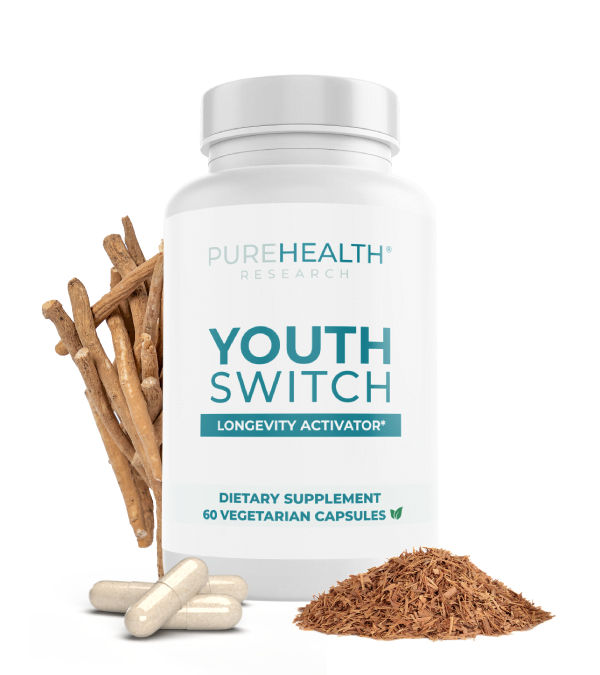7 Best Vitamins for Men Over 40
Discover the best vitamins for men over 40 to support energy, immunity & overall health. Boost your wellness with these essential nutrients today!


The best vitamins for men over 40 aren’t always so clear. As men age, their nutritional needs change. Those stepping into their forties often experience a new set of health challenges. These challenges owe their roots to hormone shifts, lifestyle changes, and increased oxidative stress. Consequently, it’s essential to adjust the nutritional focus to meet the evolving demands of our bodies.
The path past the 40-year mark is beautiful and filled with newfound wisdom, experience, and vitality. However, it also comes accompanied by reduced metabolic rate, increased fatigue, decreased bone and muscle strength, and potential risks to heart health. While these changes are daunting, recognizing them is the first step towards mitigating their impact. Thus, the power lies in achieving a balance through supplementation and lifestyle adaptations.
Throughout the years, there has been a rise in dietary supplement use from 25% to 70%. This shift towards supplements shows interest in supporting good health and vitality. In this article, we’ll explore some of the best vitamins for men over 40 and examine how specific vitamins influence underlying nutritional gaps. It’s essential to remember that everyone’s individual needs might vary, and what works best for one person may not work for another.
How Do Men’s Health Needs Change Over 40?
Once the male body reaches 40, it inevitably starts to undergo changes that might affect its gut functionality. These shifts are natural and are part of aging. And while some transformations may be more clearly noticeable — like changes in physical stamina or variations in sleep patterns — others are more subtle, like changes in nutritional needs. Some of the physiological changes that can impact men’s health post-40 include:
- Decreased Muscle Mass
- Slower Metabolism
- Lower Energy Levels
- Lower Male Hormone Levels
- Increased Stress Hormone Levels
Knowing this, the scientific community constantly pursues understanding how nutrition affects our overall well-being. Even more so for men over 40, whose nutritional needs vary dramatically. Emerging research touches upon the importance of certain vitamins tailored specifically for men in this age group.
What Are the Best Vitamins for Men Over 40?
Various essential vitamins play a significant role in promoting health and overall well-being for men over 40. These elements contain different compositions, with each having unique benefits.
1. Vitamin D
Vitamin D (the “sunshine” vitamin) supports bone health, immune function, and muscle maintenance, which are vital for men over 40. According to a study, this essential vitamin supports the skeleton and can keep bones strong. With aging, when to start using anti-aging products becomes a relevant question, not just for skin care but for overall health, including ensuring adequate Vitamin D intake.
However, naturally obtaining this vitamin can be challenging (supposing you have limited exposure to sunlight). Thus, it’s important to include vitamin D-rich foods in your diet. Additionally, consider taking vitamin D3 and K2. The combination of these vitamins ensures that calcium is efficiently absorbed and properly utilized in the body, promoting strong bones and cardiovascular health.
2. Magnesium
Magnesium is another essential nutrient that is important for men over 40. It contributes to heart health, supports muscle function, and promotes overall relaxation. Magnesium also plays a crucial role in the body by taking part in over 300 biochemical reactions that occur within it. For men who find themselves at an advanced age, it can help to alleviate sugar-related diseases.
3. Vitamin B12
Vitamin B12, or cobalamin nutrient, is primarily obtained from animal products. However, you can also find it in fortified foods and supplements. Studies have confirmed that this vitamin is essential for forming red blood cells and DNA. Moreover, it is vital in the normal function and development of our brain and nerve cells as it helps alleviate cognitive decline in aging men.
Our bodies extract vitamin B12 from the protein in the food we eat through the hydrochloric acid and enzymes present in the stomach. The nutrient then binds with another protein — intrinsic factor — for absorption in the small intestine. Therefore, absorbing enough B12 is not solely about consumption; sufficient intrinsic factor is equally important.
While vitamin B12 deficiency due to a lack of intrinsic factors may occur in some people, it’s not a concern for everyone over 40. However, a balanced diet with B12-rich foods or supplements can usually ensure sufficient intake.
4. Zinc
Zinc is a valuable nutrient that our bodies cannot produce. Therefore, we must get it from our diet. This element plays a crucial role in protein synthesis and helps in promoting our immune system. Often overlooked when it comes to nutrition, zinc is a significant micronutrient our bodies need.
Can you imagine enjoying food without a proper sense of taste and smell? Without ample zinc, this can be a reality. Its role in cell growth and division underlines its importance for maintaining healthy skin, making it a key nutrient in strategies on how to remove neck wrinkles at home. It even helps with night vision. Our body requires this vitamin for normal growth and health — as it’s involved in several aspects of cellular metabolism.
5. Omega-3
Omega-3s are essential fats that our bodies cannot make. However, we can get them from foods like fish, flaxseeds, and chia seeds. A proper diet that includes omega-3 can yield a plethora of benefits, such as support for mental health, eye health, and reducing factors associated with metabolic syndrome. Therefore, consuming enough of this nutrient in your forties will support your vision and improve cognitive-related functions.
6. Vitamin C
Among the vitamins for men over 40, vitamin C stands as the antioxidant every man should not miss. It aids in controlling infections and handling free radical damage. Additionally, this vitamin helps our bodies create a protein that’s woven throughout our body, contributing to various crucial functionalities of the nervous, immune, bone, cartilage, and blood systems, among others.
Vitamin C has a major role in helping produce several hormones and chemical messengers used by the brain and nerve functions. It’s also a water-soluble vitamin, which means our body can’t store it. Thus, it needs daily consumption, either from food or supplements.
7. Vitamin E
Similar to vitamin C, vitamin E is an antioxidant. A study shows it’s one of the body’s primary defenders against oxidation. Vitamin E supports immune function and helps widen blood vessels, thus allowing for the freer flow of blood. Eating a balanced diet of nuts, seeds, vegetables, and fortified cereals can typically provide the required amounts of vitamin E for men over 40.
How to Select the Best Vitamins for Men Over 40?

While everyone’s nutritional needs vary, some common considerations exist when choosing the best vitamins for men over 40 for energy or nutrients. Your choice of vitamins should ideally align with your lifestyle and dietary needs. Ponder about the following vital criteria to choose the appropriate vitamins your body needs.
What Are Your Health Objectives?
Your choice of vitamins will significantly impact your health objectives. For instance, consider a comprehensive multivitamin if you seek a nutrient boost to support your overall well-being. However, if maintaining energy and vitality is your main focus, explore products specifically formulated for these objectives, such as PureHealth’s Youth Switch.
Are There Any Specific Dietary Conditions to Consider?
Your vitamin choice may also depend on your dietary requirements. It’s crucial to ensure that your vitamins don’t contain animal-derived ingredients if you lead a vegetarian or vegan lifestyle. Conversely, if you’re on a low-sodium diet, you need to make sure your chosen vitamin conforms to this requirement.
Quality Matters
Quality is a primary factor to consider when purchasing vitamins. Look for brands that third-party testing has verified to meet quality standards. PureHealth’s Youth Switch serves as an example of a high-quality product formulated with diligence.
Read the Label
Even though we’re often warned not to judge a book by its cover, this advice doesn’t apply to vitamins. Most of the information you need about a product is on its label. Make sure to read it carefully to understand the ingredients, serving size, and the benefits each ingredient offers.
Consider the Form
The form of vitamins matters because they vary in effectiveness, convenience, and taste. Choose a format that best fits your needs and preferences. Some of the common forms of vitamins include the following:
- Capsules: In this format, a dissolvable gelatin or vegetable-based casing encloses the powder or liquid vitamin within. They make for easy swallowing and generally have less taste than tablets. For those with swallowing difficulty, it’s possible to open some capsules and mix their contents with food and liquid.
- Tablets: Tablets are simply compressed forms of vitamin powders and are often less costly than other forms. However, some people might find them hard to swallow, or they could have a distinct taste. Moreover, tablets can sometimes contain added fillers and binders.
- Softgels: The construction of softgels is much like capsules, but they contain liquid or oil-based vitamins inside a soft, flexible gelatin shell. This characteristic makes them relatively easier to swallow and potentially faster to absorb than tablets.
- Liquid: Liquid vitamins are advantageous for those who have trouble swallowing pills. You can mix them easily with drinks. However, handle them properly as they might have a shorter shelf-life or get easily contaminated.
- Chewables or Gummies: Chewable or gummy vitamins are easy to eat and usually come with pleasing flavors. This aspect makes them ideal for those looking for an alternative to swallowing pills. However, some chewable vitamins might have added sugars and may not offer as broad a nutrient spectrum as other forms.
Understanding the Nutritional Needs of Men Over 40

Men’s nutritional needs shift in their 40s due to changes in metabolism, body composition, and health status. Optimizing your diet to support physical energy, mental function, and long-term health is vital when reaching that age. The nutritional needs of men over 40 should consider both macronutrients and micronutrients and their unique benefits. Also, incorporating the best longevity supplements into your dietary regimen can further enhance your ability to support overall well-being and longevity.
Macronutrients
Macronutrients are needed in larger quantities because they’re the primary components of our diet. Some of the most common types of macronutrients include:
- Proteins: These macronutrients are essential for maintaining physical strength and muscle growth, particularly as muscle mass decreases with age. Chicken, turkey, fish, eggs, legumes, and tofu are among the most frequently consumed proteins.
- Carbohydrates: These provide the necessary energy the body needs. In this group, we can find whole grains and high-fiber carbs like oats, fruits, and vegetables. These carbs aid in maintaining a healthy weight and supporting a healthy gastrointestinal system.
- Fats: Essential for heart health and inflammation control. Incorporating foods rich in omega-3 fatty acids and olive oil is highly recommended for a well-rounded diet.
Micronutrients
This group includes vitamins and minerals that the body may need in smaller quantities but play a tremendous role in health support.
For instance, vitamin B12 assists in forming red blood cells and functioning nerves, while vitamin D supports bone health and immune function. Vitamin E, a well-known antioxidant, protects cells from damage.
Additionally, minerals (magnesium, potassium, and calcium) contribute to bone health, heart rhythm maintenance, muscle function, and supporting overall cellular activity.
Therefore, a balanced diet meeting these nutritional needs not only supplies essential nutrients but also bolsters natural functions and supports mental health. However, each individual may have different nutritional needs based on factors like lifestyle, health, and genetics. Personalizing a diet is thus crucial for maintaining optimal health in men over 40.
Sample Meal Plan for Men Over 40
With the abovementioned nutrient requirements in mind, having a solid diet to rely on when reaching that age is paramount to ensuring long-term wellness. Consider this approachable meal plan that includes foods rich in essential vitamins:
Breakfast
- Spinach and mushroom omelet (Vitamin D, E, and B12)
- Whole-grain toast (Vitamin B12)
- Fresh orange juice (Vitamin C)
Lunch
- Grilled chicken salad with mixed greens, bell peppers, and cherry tomatoes (Vitamin B12, C, and E)
- Brown rice or quinoa (Vitamin B12)
- A piece of fruit (Vitamin C)
Dinner
- Baked salmon with a side of steamed vegetables, like broccoli and asparagus (Vitamin D, B12, and C)
- Sweet potato (Vitamin C and E)
Snack
- Mixed nuts or almonds (Vitamin E)
- Greek yogurt with berries (Vitamin B12 and C)
Support Your Vitality With the Power of Supplements
For men over 40, integrating the best vitamins and nutrients is crucial for sustaining peak health. To maintain enduring energy, mental clarity, and overall vitality, it’s essential to focus on previously mentioned nutrients. Yet, daily incorporation can be challenging. This is where supplements for men’s health come into play, offering an easy and effective way to ensure you’re getting the necessary nutrients to support optimal well-being, even with a busy lifestyle.
Youth Switch includes potent ingredients like:
- Ashwagandha
- Cat’s Claw Bark Extract
- Astragalus Root
- L-Lysine HCL
- L-Ornithine Alpha-Ketoglutarate (OKG)
- Ceylon Cinnamon
- L-Citrulline
- L-Glutamine
Embracing a balanced lifestyle and prioritizing health is the foundation for a vibrant, fulfilling life. Start your journey to optimal wellness with Youth Switch, and empower your body and mind with the best vitamins and nutrients.
Conclusion
In conclusion, ensuring adequate intake of key vitamins and minerals like Vitamin D, Magnesium, Vitamin B12, Zinc, Omega-3, Vitamin C, and Vitamin E is vital for men over 40 to maintain optimal health. These nutrients play crucial roles in supporting bone density, muscle function, cognitive abilities, and immune defense. By incorporating these vitamins into their daily regimen, men can promote overall well-being and address specific age-related health concerns effectively.
Consider the unique nutritional needs of men over 40 when selecting the best vitamins for them. They need more vitamin B12 for energy, vitamin D3 for bone health, and omega-3 fatty acids for heart health. Ensure the chosen ones lack fillers, use high-quality ingredients, and have passed third-party testing for safety and potency.
Men over 40 need fewer calories but more specific nutrients, including protein, calcium, vitamins D and B12, fiber, and omega-3 fatty acids, to support muscle, bone, energy, brain, digestion, and heart health. A balanced diet and regular exercise help meet these needs.
Sign up for our Healthy Living newsletter!
Advertisement. This site offers health, wellness, fitness and nutritional information and is designed for educational purposes only. You should not rely on this information as a substitute for, nor does it replace, professional medical advice, diagnosis, or treatment. If you have any concerns or questions about your health, you should always consult with a physician or other health-care professional. Do not disregard, avoid or delay obtaining medical or health related advice from your health-care professional because of something you may have read on this site. The use of any information provided on this site is solely at your own risk.











